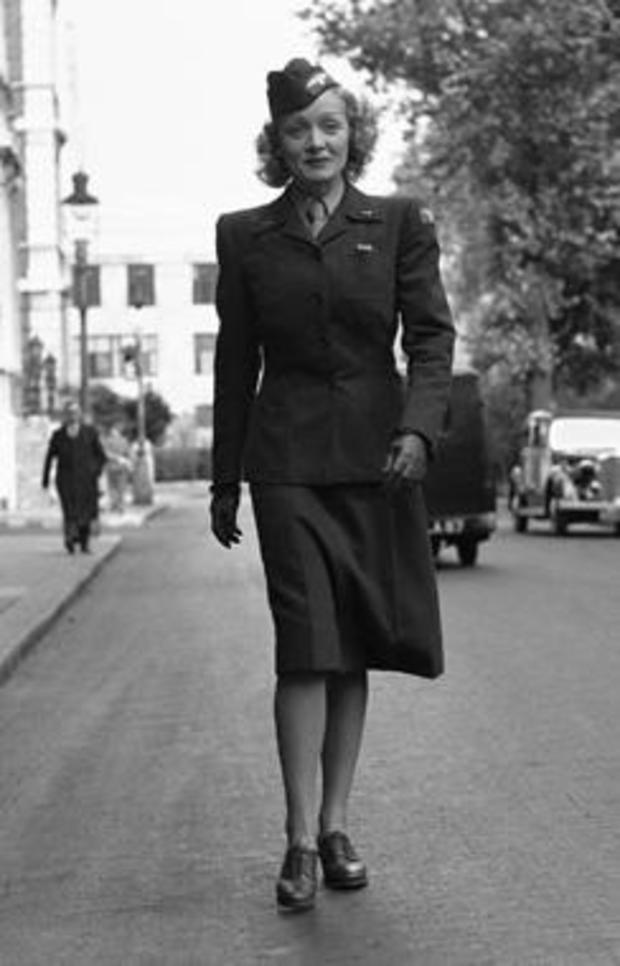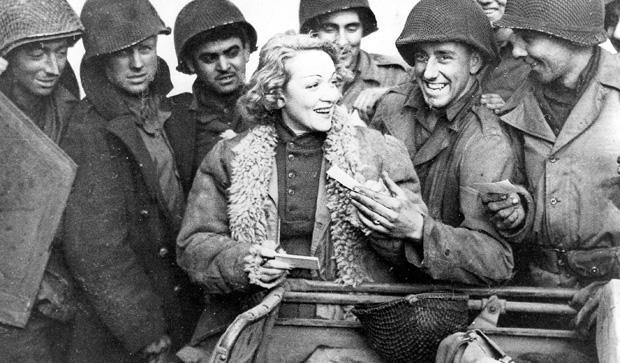"Mobituaries": Marlene Dietrich goes to war
Marlene Dietrich was 100%.
Like Elizabeth Taylor, Marlene Dietrich today is remembered by many for her beauty. But Dietrich's persona – cool, husky-voiced, at times androgynous – was always more daring. As the theater critic Kenneth Tynan wrote, "Her masculinity appeals to women and her sexuality to men." In the western "Destry Rides Again" Dietrich gets into a bar fight, a real knock-down, drag-out with another woman, rolling around the floor, before Jimmy Stewart dumps a bucket of water on both of them. Then Dietrich attacks him with a bottle, a chair, and her fists.
Turns out Dietrich wasn't afraid of a good fight in real life. "Destry" came out in 1939, the year Hitler's Germany invaded Poland, commencing World War II. And Dietrich stepped right into the breach to help her new beloved homeland, the United States of America, defeat the country of her birth. "I don't think she was ever happier, more fulfilled, than when she was serving the Allied troops," Dietrich's grandson Peter Riva told CBS correspondent Mo Rocca. She knew well what was at stake.
"Marlene was staunchly opposed to autocrats and fascists. When she got to that position of security and fame she took every opportunity she could to oppose the Nazis," Riva said. "German foreign minister von Ribbentrop came to visit her [in 1937] at the Lancaster Hotel in Paris bearing a 'Mother's Cross' to woo Marlene back to Germany. It would have essentially made her 'Queen of Germany' with the promise of a carefree life. She said no then and many other times. Hitler never asked again, just labeled her a traitor to the Fatherland."
And then in 1939 this woman, who was culturally German to the core, publicly renounced her home country and became an American citizen. She made sure the cameras were there when she was sworn in. "She wanted the oath of American citizenship to be captured on film," says Riva, "in order to send a message to the Third Reich and good Germans – for them to know she was taking that stand."
With the bombing of Pearl Harbor, she went further. In 1942, she traveled throughout the United States to promote the purchase of war bonds. Some estimates credit her with raising a million dollars in sales. But Dietrich's greatest efforts were for the USO. In 1944 and 1945 she volunteered for multiple tours, entertaining as many as half a million troops and prisoners of war in Algeria, Italy, France, and Germany for eighteen straight months. She earned a reputation for abiding the rough conditions – a lack of electricity, sleeping in tents – and for being willing to tour near enemy lines.
"Actually I think Dietrich wanted to be a soldier and you couldn't very well be a soldier so she fought her way," said her daughter, Maria Riva, in a 1996 British documentary.
For the rest of her life, Marlene Dietrich shared a bond with the young men alongside whom she'd served. "They were her boys," says Peter Riva. "She felt responsible for them. She felt grateful to them."
Adapted from "Mobituaries: Great Lives Worth Reliving" by Mo Rocca, published by Simon & Schuster (a division of CBS), in Hardcover, eBook and Audio formats, available via Amazon.
To hear the full audiobook excerpt "Marlene Dietrich Goes to War," click here.
You can download episodes of "Mobituaries with Mo Rocca" for free on Apple Podcasts, Google Play, iHeartRadio, Megaphone, Spotify, Stitcher or Tunein. New episodes will be available weekly. For RSS feed click here.
For more info:
- "Mobituaries" (Simon & Schuster)
- Follow @MoRocca on Twitter





